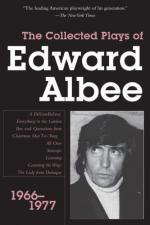|
This section contains 1,976 words (approx. 7 pages at 300 words per page) |

|
SOURCE: "An Elegy for Thwarted Vision: Edward Albee's The Lorca Story: Scenes from a Life," in Journal of Dramatic Theory and Criticism, Vol. IX, No. 2, Spring, 1995, pp. 143-7.
In the following essay, Luere examines The Lorca Story: Scenes from a Life, in which, he asserts, Albee presents "an elegy for an artist's thwarted vision."
For over three decades, Edward Albee's controversial drama has kept him in the critical and public consciousness. With self-assurance, Albee has disregarded commercial pressure, experimented with dramatic form, and thrust innovative theater at his audiences. How natural, now, to find Albee evolving a play on artistic freedom. His present venture, The Lorca Story: Scenes from a Life, is more than a political or social tract; it is an elegy for an artist's thwarted vision.
The play's protagonist, Federico Garcia Lorca (c. 1900–1936), was the Spanish poet-playwright executed during the Fascist reign of General Francisco Franco...
|
This section contains 1,976 words (approx. 7 pages at 300 words per page) |

|


